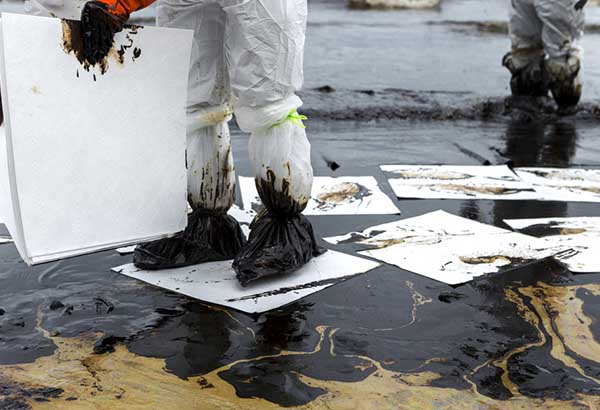
An Intensive 5-day
IMO Model Training Course on Oil Pollution Preparedness, Response and Co-operation (OPRC)
Level 3 - Senior Managers and Administrators
Scheduled Dates
Classroom
| 20-24 Apr 2026 | Dubai - UAE | $5,950 | RESERVE A SEAT |
| 24-28 Aug 2026 | Abu Dhabi - UAE | $5,950 | RESERVE A SEAT |
| 28 Sep-02 Oct 2026 | London - UK | $5,950 | RESERVE A SEAT |
| 26-30 Oct 2026 | Dubai - UAE | $5,950 | RESERVE A SEAT |
| 14-18 Dec 2026 | Dubai - UAE | $5,950 | RESERVE A SEAT |
Online
| 20-24 Apr 2026 | Online | $3,950 | RESERVE A SEAT |
Would an alternative date be more suitable?
We offer a variety of tailored training options, customized to meet your organisation's needs. Delivered anytime, anywhere, we make it easy to bring expert training directly to your team.
Why Choose this Training Course?
A major oil spill can severely impact an organization in many ways (loss of production, bad reputation, financial losses, environmental issues etc.) Therefore, it is in the best interest of all organizations to be prepared for such events by developing strategies, contingencies and providing their team with the right knowledge and skills needed to handle such situation in a responsible manner.
This IMO Model OPRC Level 3 Oil Spill Management training course provides administrators, senior managers and officials the confidence, methods and skills needed to manage such events and help move towards business continuity.
The direction and timely support from the senior managers and officials can reduce the overall impact from a major oil spill. Window of opportunity exists in all major incidents; it is ability of senior managers and officials to recognize this and accordingly act. The environmental impacts, health and safety of Responders and others, and the socioeconomic impacts are all very much relevant and needs to be handled in a professional and controlled manner
This IMO Model OPRC Level 3 Oil Spill Management training course will highlight:
- Strategies and policies.
- Methods and means of communication with stakeholders.
- Information gathering and Media Management.
- The importance of leading from front.
- Managing health, safety, and environmental concerns.
What are the Goals?
By the end of this IMO Model OPRC Level 3 Oil Spill Management training course, participants will learn to:
- Understand international laws and requirements.
- Develop oil spill response policies and procedures.
- Understand the environmental and socioeconomic issues.
- Effectively communicate with different stakeholders.
- Understand the criteria for the Termination of Response.
Who is this Training Course for?
IMO Model OPRC Level 3 Oil Spill Management training course is designed for employees who will/may be asked to command or support during a major oil spill incident on behalf of the organization.
This IMO Model OPRC Level 3 Oil Spill Management training course is suitable to a wide range of professionals but will greatly benefit:
- Officials involved in developing, monitoring and supervising major incidents at national/city level.
- Senior managers and executives.
- Employees nominated as incident commanders by the organizations.
- Managers and supervisors involved directly/indirectly in emergency preparedness and response.
- Any other individual who wishes to improve their knowledge and understanding of the oil spill response.
How will this Training Course be Presented?
Participants to this training course will receive a thorough training on the subjects covered by the outline with the tutor utilising a variety of proven adult learning teaching and facilitation techniques. Training methodology include PowerPoint presentations explain the concept, practical classroom exercises to reinforce the learning objectives. Role plays and desktop exercises will be used to demonstrate the implementation of different subjects.
Organisational Impact
With a trained and qualified incident commander, the organization will:
- Have the knowledge and skills to develop strategies and policies.
- Have a peace of mind that oil spill emergency will be effectively manage.
- Be in compliance with the national and international requirements.
- Be able to develop better cooperation with other industries and local Authorities.
- Focus more on mitigation measure to avoid emergencies and penalties/liabilities.
- Have a workforce that is more aware of potential emergencies and consequences.
- Good systems and controls manage incidents.
Personal Impact
This IMO Model OPRC Level 3 Oil Spill Management training course provides the individual with:
- Better communication skills when dealing with emergencies.
- The ability to think logical and proactively.
- Understanding the needs and expectations of different stakeholder during an emergency.
- The knowledge of environmental impacts.
- Ability to manage a team from different fields.
- Negotiation skills.
Daily Agenda
Day One: Overview of “Emergency Planning”
- Overview of Spill Response
- Contingency Planning Response Management and Organization
- Sensitivity Mapping
- Behavior and Fate of an Oil Spill
- Environmental and Economic Impact of Oil Spills
- Spill Assessment
- Operations Planning
Day Two: Overview of “Emergency Response”
- Oil Spill Response Options
- Containment, Protection and Recovery of Oil
- Dispersants
- Shoreline Clean-up
- Site Safety
- Waste Management
Day Three: Legal Framework
- Introduction to IMO
- International Cooperation and Legal Framework.
- The roles of government and other key stakeholders.
- Places of Refuge and Salvage Considerations.
- Planning and Cooperation.
- The international compensation regime.
- Liability for claims and Compensation
Day Four: Response Management
- Strategic Directions and Policies.
- Effectiveness of Oil Spill Response Plan.
- Leadership during an Emergency.
- Incident Management Systems (IMS).
- Roles and Responsibilities.
- Termination of Response.
- Post-Incident Debriefing.
- Window of opportunity.
Day Five: Communication
- Information Gathering and Record Keeping.
- Communications and Information Sharing.
- Internal & External Communication Requirements.
- Media Relations.
- Negotiation.
- Emergency Public Information Plan.
Certificate
- On successful completion of this Training Course / Online Training Course, a PetroKnowledge Certificate / E-Certificate will be awarded to the delegates.

